| Srl | Item |
| 1 |
ID:
106326
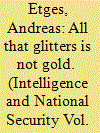

|
|
|
|
|
| Publication |
2011.
|
| Summary/Abstract |
The coup against Mossadegh has often been described as the beginning of the 'Golden Age' of the CIA. The article argues that, while the coup was successful in getting rid of Mossadegh, its negative short-term and long-term consequences in Iran but also for the United States weigh heavily. Without thorough analysis why it nearly failed, the coup became a fatal catalyst for other interventions of the CIA that led to the Bay of Pigs disaster. If intelligence activities lose their moral dimension and if success is exclusively measured by 'mission accomplished', in the end more will be lost than gained.
|
|
|
|
|
|
|
|
|
|
|
|
|
|
|
|
| 2 |
ID:
106328


|
|
|
|
|
| Publication |
2011.
|
| Summary/Abstract |
This article looks at specific instances of how the United Kingdom's strategic culture dealt with two specific perceived security challenges - Afghanistan as the home of terrorism and Iraq as the supposed possessor of weapons of mass destruction (WMD) - and how the UK's cultural background both determined and misled those involved in the intelligence cycle. These were not new problems - the UK intelligence community had been aware of the potential for cultural bias for decades but repeatedly failed to learn the appropriate lessons. In the case of Iraq these endemic problems led to failures at all four stages of the traditional intelligence cycle - requirement-setting, collection, assessment and dissemination. The overall result was a loss of public confidence in intelligence which may have lessened its overall influence in the wider strategic culture for many years. However, the main blame attaches to the politicians who misused and abused intelligence to justify their purely political decisions to undertake aggression against a sovereign state.
|
|
|
|
|
|
|
|
|
|
|
|
|
|
|
|
| 3 |
ID:
106330
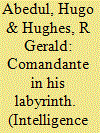

|
|
|
| 4 |
ID:
106320
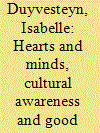

|
|
|
|
|
| Publication |
2011.
|
| Summary/Abstract |
Are a hearts and minds approach, reliable intelligence and cultural awareness the most important ingredients for success in counter-insurgency, as present prescriptions claim? This article focuses on some of the notable non-kinetic aspects of counter-insurgency and aims to critically reflect on their role and importance. It argues that the hearts and minds ideas, the emphasis on intelligence and cultural awareness are often problematic both for their methodological foundations and empirical weight. The article closes by identifying avenues for further research.
|
|
|
|
|
|
|
|
|
|
|
|
|
|
|
|
| 5 |
ID:
106329
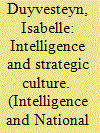

|
|
|
|
|
| Publication |
2011.
|
| Summary/Abstract |
Intelligence and strategic culture are two important research domains which have only recently been linked. This contribution brings together some of the insights of the contributions in this special issue and it attempts to formulate some challanges for future research.
|
|
|
|
|
|
|
|
|
|
|
|
|
|
|
|
| 6 |
ID:
106322


|
|
|
|
|
| Publication |
2011.
|
| Summary/Abstract |
With a steady release of material into The National Archives (UK), scholarly interest in imperial and commonwealth history as well as the field of intelligence studies has grown. The Malayan Emergency continues to provide a wealth of material, particularly for those interested in counter-insurgency. Yet the colonial police, and by extension their intelligence branches, have received less attention. This article considers new evidence of the organizational changes that occurred and the discussions that took place between the Colonial Office, the Malayan Government, the Malayan Police and the wider intelligence community which led to a restructuring of the Malayan Police and its Special Branch. It charts the rise of the Malayan Police Special Branch during the early stages of the emergency and its disentanglement from CID, reflecting on how police reform was shaped as much by external agencies as by local considerations.
|
|
|
|
|
|
|
|
|
|
|
|
|
|
|
|
| 7 |
ID:
106324
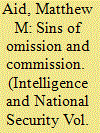

|
|
|
|
|
| Publication |
2011.
|
| Summary/Abstract |
American intelligence professionals have long understood that the US intelligence community is, and always has been, a closed and insular society, with each agency within the intelligence community taking pride in having its own unique bureaucratic identity, distinct corporate culture, operating environments, social dynamics, and internal behavior patterns that have been molded and shaped by external events and internal forces over the past 60 years. These 'strategic cultural' factors mean that the agencies comprising the US intelligence community are, in many respects, unique bureaucratic entities, operating far differently than comparable large American corporations and government agencies. These strategic cultural factors shape and define the environment within which the US intelligence agency works, dictate how American intelligence agencies perform their mission, and also help to explain why they repeatedly make the same mistakes and find it difficult to fix the longstanding problems which contributed to the failures. Within the context of the recent 9/11 and Iraqi weapons of mass destruction intelligence failures, this article explores the role played by these strategic cultural factors in helping to explain a series of historical intelligence failures by the US intelligence community.
|
|
|
|
|
|
|
|
|
|
|
|
|
|
|
|